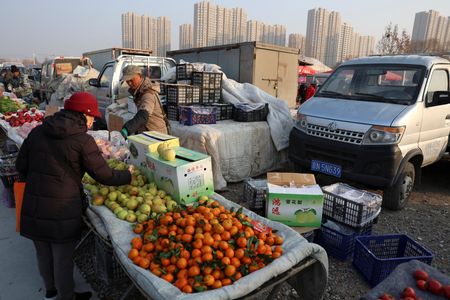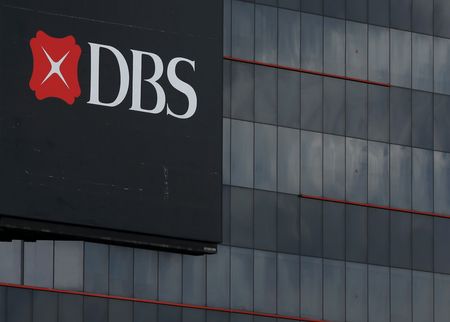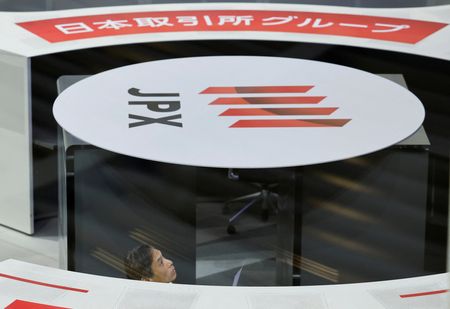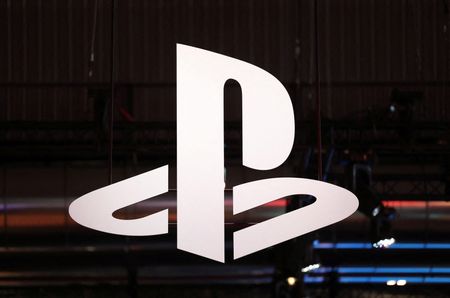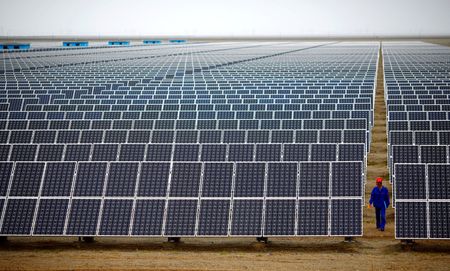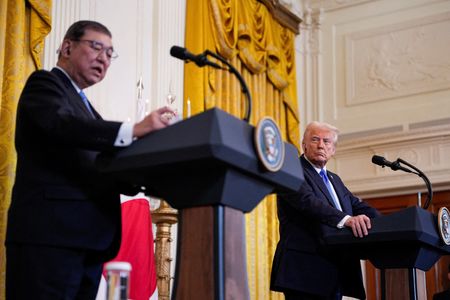BEIJING (Reuters) -China’s consumer inflation accelerated to its fastest in five months in January while producer price deflation persisted, reflecting mixed consumer spending and weak factory activity.
Deflationary pressures are likely to persist in China this year, analysts say, unless policymakers can rekindle sluggish domestic demand, with tariffs by U.S. President Donald Trump on Chinese goods adding pressure on Beijing to spur growth in the world’s second-largest economy.
The consumer price index rose 0.5% last month from a year earlier, quickening from December’s 0.1% gain, data from the National Bureau of Statistics showed on Sunday, above the 0.4% rise estimate in a Reuters poll of economists.
Core inflation, excluding volatile prices for food and fuel, sped up to 0.6% in January from 0.4% the previous month.
Although consumer prices are expected to rise gradually, producer prices are unlikely to return to positive territory in the short term as overcapacity in industrial goods persists, said Xu Tianchen, senior economist at the Economist Intelligence Unit.
“If measured by the GDP deflator, it will still take a few quarters to get out of deflation, ” Xu said.
The numbers were skewed by seasonal factors, as the Lunar New Year, China’s biggest annual holiday, began in January this year versus February last year. Typically, prices rise as consumers stockpile goods, particularly food for big family gatherings.
Prices of airplane tickets rose 8.9% from a year earlier, tourism inflation was 7.0% and movie and performance ticket prices rose 11.0%.
Consumer spending reports over the holidays were mixed, reflecting worries over wage and job security.
While Chinese flocked to movie theatres and spent more on shopping, catering and domestic travel, per capita spending during the holidays grew by only 1.2% from a year earlier, versus a 9.4% rise in 2024, analysts at ANZ estimated.
CPI edged up 0.7% in January from the previous month, below the forecast 0.8% rise and compared with an unchanged outcome in December.
For 2024, CPI rose 0.2%, in line with the previous year’s pace and well below the official target of around 3% for last year, suggesting inflation missed annual targets for the 13th straight year.
China’s provinces have announced 2025 economic growth targets with the average of target prices below 3%, showing that policymakers are anticipating changes and pressures on the price level, said Bruce Pang, adjunct associate professor at CUHK Business School.
China’s manufacturing unexpectedly contracted in January, while services activity weakened, keeping alive calls for more stimulus. Beijing is widely expected to retain its economic growth forecast of around 5% this year, but fresh U.S. tariffs will put stress on exports, one of the few bright spots in the economy last year.
The producer price index declined 2.3% on year in January, matching December’s drop and deeper than the forecast 2.1% fall. Factory-gate prices have remained deflationary for 28 straight months.
The government is not expected to change monetary or fiscal policy before the annual parliament session in March, said Zhiwei Zhang, president and chief economist at Pinpoint Asset Management.
“For policymakers, external uncertainty seems to rank higher than domestic economic challenges at this stage,” Zhang added.
(Reporting by Qiaoyi Li, Liangping Gao and Ryan Woo; Editing by William Mallard and Jacqueline Wong)

